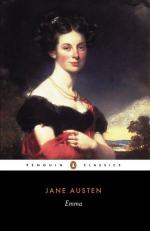|
This section contains 7,753 words (approx. 26 pages at 300 words per page) |

|
Hierarchy of Language in Jane Austen's Emma
Summary: An exploration of the use and misuse of language in Jane Austen's Emma.
Jane Austen writes social novels. Her societies are microcosms of relative stability in a rapidly changing world. Within these restricted realms, class structure is rigid; however, members of this society participate in one common activity: discourse. Due to the vagaries and incompetencies among the characters, not all conversations in Emma conform to the ideals of communication, and in fact, contribute to the promulgation of the central conflict. Henry Fielding proposed in his Miscellanies, that conversation should resemble "that reciprocal Interchange of ideas, by which Truth is examined, and all our Knowledge communicated to each other [and which] contributes to the moral improvement of society but presupposes, under ideal circumstances, a reciprocity between participants." Austen confirms this view of discourse in her novel by creating a hierarchy of language and making clear and meaningful conversation possible only between "persons whose Understanding is pretty near on an Equality with our...
|
This section contains 7,753 words (approx. 26 pages at 300 words per page) |

|


